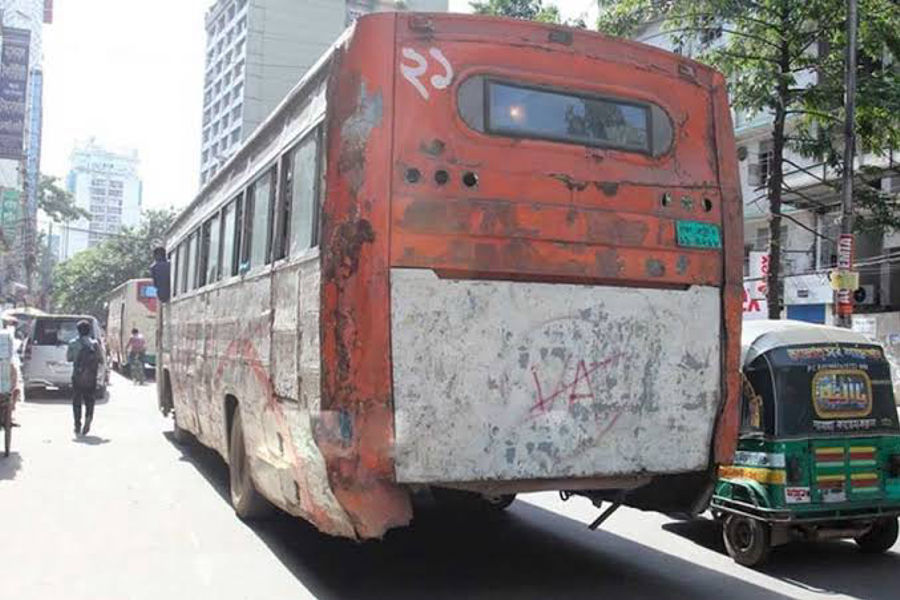
Published :
Updated :

The interim government had given transport owners a six-month ultimatum to remove all unfit vehicles from the roads. To facilitate this transition, the transport owners were even offered soft loans so that they can replace their rundown fleets with newer, safer vehicles. However, despite these incentives and the ample time provided, transport owners remained largely indifferent, taking visibly no steps to comply with the directive. Instead, when the deadline ended and the law enforcement agencies launched a crackdown on unfit vehicles from early July, transport owners are now responding not with compliance, but with defiance.
In a reckless and audacious move, several organistion of transport owners and workers recently issued 15-working-day ultimatum to the government to stop the drive against old, unfit and unsafe vehicles. Otherwise, they warned of enforcing a 72-hour nationwide transport strike from 6 a.m. on August 12 to 6 a.m. on August 15. Transport strikes have already been enforced in several districts, and now the fear of broad disruption looms large.
The transport owners' eight-point list of demands includes extending the economic lifespan of commercial vehicles from the current 20-25 years to 30 years, amending the Road Transport Act-2018, reducing the recently increased presumptive income tax on commercial vehicles to previous levels, formulating a scrappage policy for old vehicles, and expediting the issuance and renewal of driving licences, among others. Some of these demands, particularly the extension of vehicle lifespan and amendments to the RTA, are not only unreasonable but also dangerous.
Reportedly, there are more than 80,000 buses, minibuses, trucks, lorries and tankers that have already exceeded their economic life as of July 16. These unfit vehicles are not only responsible for frequent accidents and traffic jam, but also emitting dangerous level of toxic gas. Considering this, the government's move to stop running of the unfit vehicles on the road has been a welcome step. But such steps had also been taken several times during the previous government, but to no avail. The transport owners' resistance to change once again raises the unanswered question: when will the transport owners and workers show due sensitivity to the issue of road safety? Is human life such a cheap commodity that we can place at the mercy of unskilled drivers of unfit vehicles?
The transport sector is critical to daily life in Bangladesh, but it has remained in disarray for decades. Every attempt to reform it has been met with fierce resistance from within. A powerful lobby of transport owners and workers has consistently sought to operate on its own terms, free from regulation and accountability.
In 2018, following a massive student-led movement for road safety, the then government enacted the Road Transport Act. However, the government could not implement the law due to opposition from entrenched transport syndicates. These same groups have repeatedly obstructed the rollout of the 'Dhaka Nagar Paribahan' service, an initiative aimed at bringing order to the capital's chaotic public transport system. Now, once again, they are trying to derail efforts to remove unfit vehicles from the roads.
The problem runs deeper. Years of unchecked political patronage and rampant corruption under the Awami League government allowed a powerful transport syndicate to take root. After the AL's fall, new politically connected groups have taken over, continuing the same culture of corruption and rent-seeking. Acting under the cover of owners' and workers' associations, they engage in illegal activities and routinely block any measure that threatens their grip on the sector.
Following the 2024 mass uprising, the public hoped that long-delayed reforms would finally materialise and order would be restored in the transport sector. Yet, nearly a year later, there is little sign of real change. This status quo is unsustainable. Transport associations must not be allowed to hold an essential public service hostage to their narrow interests. The government must stand firm in taking all lawful and necessary actions to restore order in this critical sector.
At the same time, for a lasting and effective resolution, all stakeholders-including transport owners-should be included in the dialogue. Legitimate concerns must be acknowledged and addressed. However, public safety must remain non-negotiable.
One potential way to break the stranglehold of private transport lobbies is to expand the role of the public sector. However, the limited number of buses operated by the Bangladesh Road Transport Corporation (BRTC) has done little to ease the crisis. According to Mozammel Haque, Secretary General of the Passengers' Welfare Association, launching a dedicated city bus service could transform Dhaka's transportation landscape. He argues that introducing just 2,000 new buses could significantly reduce chaos and improve service.
To this end, the government has announced plans to introduce electric bus services in Dhaka under a World Bank-funded project, citing the city's worsening air pollution and environmental concerns. However, unless the entrenched syndicates controlled by vested interests could be dismantled, no government move to improve the capital city's passenger bus service will succeed. It is time for the government to act firmly as we have already lost too many precious lives in what looked like avoidable accidents.
aktuhin.fexpress@gmail.com


 For all latest news, follow The Financial Express Google News channel.
For all latest news, follow The Financial Express Google News channel.